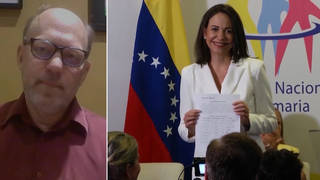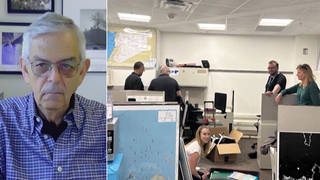
Israeli Prime Minister Ehud Barak and Palestinian leader Yasser Arafat are returning to the Middle East amid heightened security after their failure to clinch a peace deal. Israeli and Palestinian security forces were bracing for possible violence today after the breakdown of the marathon Camp David talks. [includes rush transcript]
Correspondents say both leaders face daunting challenges at home, although each leader will be praised by their own people for not compromising over Jerusalem. Barak warned that the region was entering a “period of considerable uncertainty.” Hundreds of Palestinians marched in Gaza yesterday, demanding a resumption of their uprising, or “intifada,” against Israel.
Guest:
- George Irani, Professor of Political Science at Washington College in Chestertown, MD.
Transcript
AMY GOODMAN:
As you heard at the top of the program, the big news of the day in the headlines, Clinton ends deadlocked peace talks. We’ll take a look at how the New York Times put it with a sub-headline: Barak is praised, Arafat is said to show less flexibility over fate of Jerusalem. At the end of two weeks of marathon negotiations with the leaders of Israel and the Palestinians, a visibly fatigued President Clinton announced yesterday they were unable to reach an agreement “at this time.” The President and other American mediators made clear it was Yasser Arafat, the Palestinian leader, who balked in the end, and by all accounts, the issue was Jerusalem, the holy city both Israelis and Palestinians claim as their sacred capital.
Speaking at the White House, Clinton singled out the Israeli Prime Minister Ehud Barak for his readiness to make hard compromises, saying, “I would be making a mistake not to praise Barak, because I think he took a big risk.” The President went on to say the Prime Minister moved forward more from his initial position than Chairman Arafat, particularly surrounding the question of Jerusalem. He also declared that the discussions at Camp David had been really unprecedented in raising issues “that had long been considered off limits.” The issue of Jerusalem, in particular, had never been discussed before by Palestinians and Israelis in face-to-face encounters.
We turn now to George Irani, a professor of political science at Washington College in Chestertown, Maryland. Welcome to Democracy Now!
GEORGE IRANI:
Hello. Good morning, Amy.
AMY GOODMAN:
Well, what do you think of the spin of the New York Times on the end of the peace talks between Arafat and Barak?
GEORGE IRANI:
Not surprising. That belongs to the usual line, to blame the victim, and basically the victims in this case are always the Palestinians, and they are always supposed to make concessions upon concessions. And, of course, Arafat is going to be chided for, you know, foiling the Camp David show. But there are many political layers behind that that we can talk about, Amy.
AMY GOODMAN:
Talk about the issue of Jerusalem.
GEORGE IRANI:
Well, Jerusalem is a complicated issue, because it’s a city that is unique, in terms of it’s a symbol for more than, I don’t know, two billion and a half people — you know, 40 million Jews around the world, one billion Christians and one billion Muslims. So it gives you a large crowd of people interested in the fate of the city. That’s one.
Two is, the city also had a long troubled history of occupations and presences all the way back to the Crusades, to the Ottomans, to the British, to Jordan, Israeli and to now total Israeli, if you want, occupation of East Jerusalem and West Jerusalem, being under Israeli control since 1948. Jerusalem also has a different transnational dimension, because it’s not only Israelis and Palestinians that have a stake in it; there are many other institutions that have, you know, a presence of interest there, such as the Vatican, such as the Orthodox churches, be it the Russian presence in the Moscowbia in Jerusalem, be it the Orthodox Greek, Orthodox presence in Jerusalem, be it the Armenians, the Copts, the Maronites, you know, a big mosaic of people that have a stake in that. So, Arafat alone could not, neither Barak, could not negotiate that without bringing all these folks into the picture. So that’s the other thing.
The third very fundamental thing is that Israel today has — you know, today, since 1967, has annexed, occupied and annexed East Jerusalem and made it its capital, and only, I think, three countries in the world recognize that; I think Costa Rica, El Salvador and Zaire, I think, have their capitals in Jerusalem. Most of the other countries, including the United States, their embassies are in Tel Aviv. And what is also very interesting that inside East Jerusalem there are several countries that have consulates, including the United States. The United States has a consulate in East Jerusalem, which is independent from the embassy in Tel Aviv, US embassy. The same, the French, the Italians, the Spanish and the Belgians, and this goes back to the old status quo under the Ottomans, who have acknowledged that, you know, East Jerusalem, Jerusalem itself, must have its own special status and protect it from any exclusive control.
AMY GOODMAN:
What about the critical issues, for example, of water, of the right of return of Palestinians?
GEORGE IRANI:
This is the key issue. Basically, you know, if you remember Christopher Hitchens once said, you know, you should always keep — pay attention to the dogs that don’t bark, and the dogs that didn’t bark in this whole deal, unfortunately, is the question of the refugees. And the Israeli governments from 1948 onwards, they don’t want to hear about the question of compensation, the whole question about policing the past, which is today very relevant in Chile and Argentina and other parts of the world. For instance, the refugees in Kosovo went back, while the Israeli government does not want the Palestinian refugees, especially from 1948, to be compensated or go back to their former lands, and this is the issue. I think this is where the whole deal lies, because the current Israeli leadership is keen on having the Palestinians sign a peace treaty and also declare officially and publicly that the Palestinians have no more claims of compensation against the Israeli government or the Israeli people. And I think this is a very hard pill to swallow for the Palestinians.
AMY GOODMAN:
And what do you think is going to happen now with Barak and Arafat flying home? What about what it is to be on the ground right now in the West Bank and Gaza.
GEORGE IRANI:
Well, Amy, you see, since the beginning of this whole charade, I call it the pacification process in the Middle East, not the peace process, pacification like our famous natives, the Native Americans. Basically, the charade is that it has been a peace concocted by leaders, be it Sadat, be it Begin, be it Netanyahu, be it Arafat, and so on, or Barak. The grassroots themselves are not ready. Neither — even, you know, the claim made today that Barak had prepared his public opinion for the concessions he was supposed to make, I think today 50 percent of the Israeli public opinion is against that. And, you know, we have seen these various demonstrations in Tel Aviv, Jerusalem by the various settlers and their Likudnik friends, and so on.
And the same thing for the Palestinians and the various Arab public opinion at large. You know, they are the victims, and they feel that, you know, things are being negotiated that are crucial, very symbolic, against their opinion, against the overall perception that this whole peace deal has been a very unjust, very unfair, and whereby the United States had not played the role, quote-unquote, of “honest broker.” We played the role of the, if you want, the — what I call the water carrier for the Israeli public opinion or public elite policies, basically.
So that’s the — so what’s going to happen now is that you have a weak leader coming back to Israel, Barak. Yeah, he did not make concessions, but he has no government. If he forms a national unity government with Likud, forget about peace. That means we’re going to have a freeze until the new administration comes here in Washington.
And then, as far as Arafat is concerned, he, too, is, you know, health-wise, he’s not in good shape, and also his internal house, he needs to put it in order. Of course, he comes in a little bit stronger, because he did not give concessions. Today, the overall opinion in the Arab world in the various media and comments is that it was a victory, that the failure of Camp David was a victory for Arafat, victory for the Arabs, the Palestinians, who did not have to make the hard — you know, the concessions that they were forced to do basically at Camp David.
So, we can foresee, Amy, a period of trouble, turmoil. I also would put Lebanon this whole deal where you have more than 350,000 Palestinian refugees rotting in their camps in a horrible condition. They could be also very easy tool to manipulate, to revamp the South Lebanon option. Not at this stage, I think; until the end of this year, South Lebanon is going to be quiet, but it is something to keep in mind. And then you still have the Golan Heights, too, which could be another, you know, source — it could be trouble, it could be peace. But from now until, let’s say, next spring, a year from now, I don’t see anything moving on the whole Middle East issue, in terms of the peace — so-called peace process.
AMY GOODMAN:
Well, Professor George Irani, I want to thank you very much for being with us. Professor Irani teaches political science at Washington College in Chestertown, Maryland.












Media Options